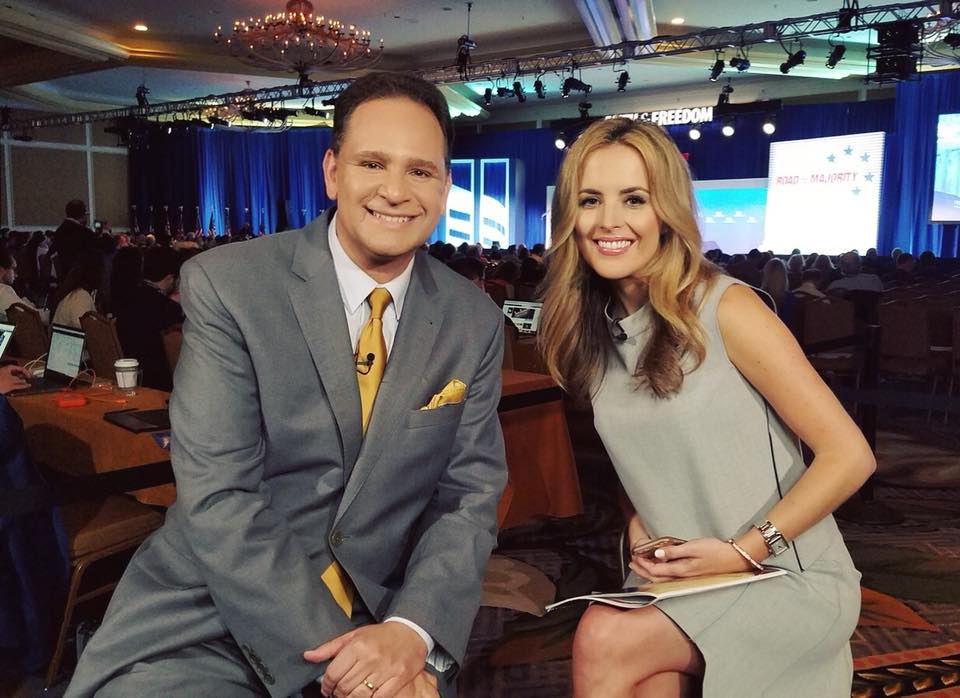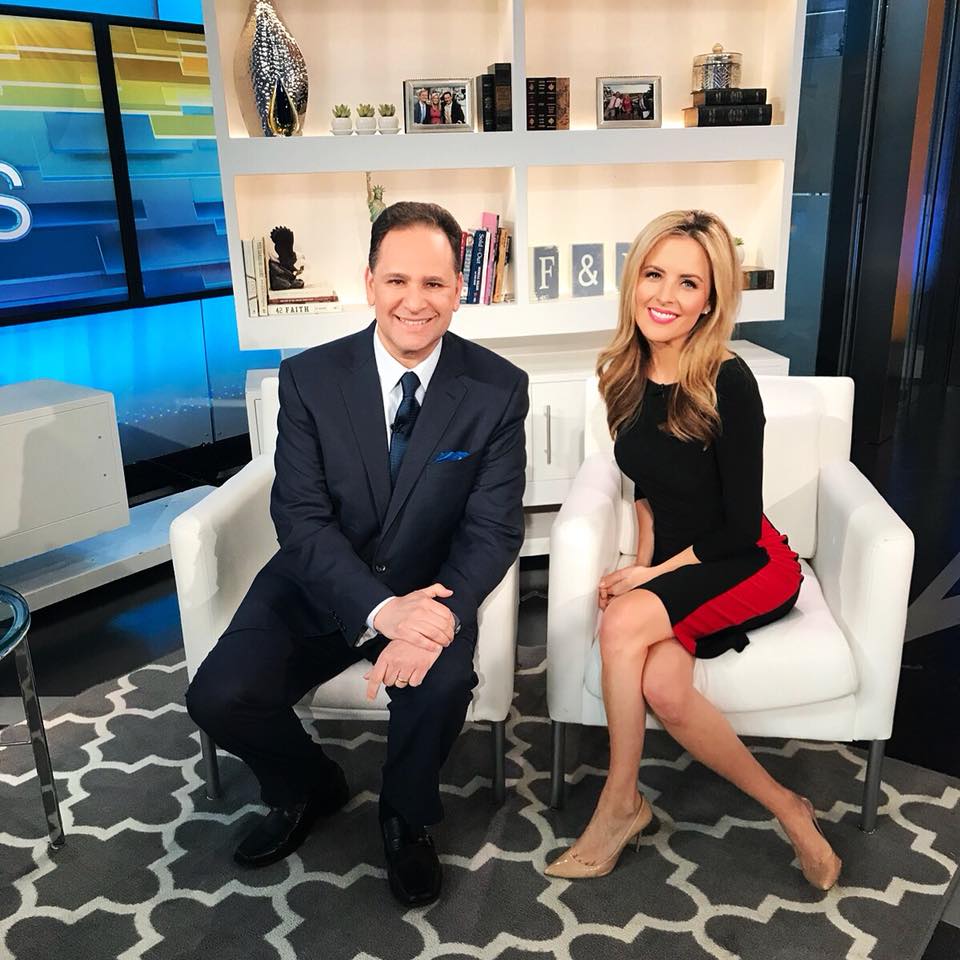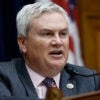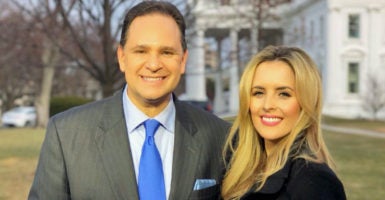David Brody and Jenna Browder are hosts of the “Faith Nation” show on Christian Broadcasting Network and Brody recently published “The Faith of Donald J. Trump” with co-author Scott Lamb. Brody and Browder spoke to Daily Signal Editor-in-Chief Rob Bluey about what it’s like to cover President Trump, why they report the news from a biblical viewpoint, and how the media can regain Americans’ trust.
Rob Bluey: Both of you have had tremendous interactions with the Trump White House and the political scene in Washington, D.C. Let’s begin by talking about what it’s like to be members of the media in this incredible time in history. Almost every day, David and Jenna, we have some sort of major news development. How do you keep up with it all?
David Brody: Where do you begin? I guess you begin by over-the-counter medication, for sure Excedrin. It’s like living in a reality TV show. I mean, it really is. Trump is the reality TV president and we’re just contestants in it. It’s just intense, but intense in a good way.
CBN has been given great access, and I think that’s been exciting for us. And just to see Trump take evangelical Christians in a very serious way—to realize they have something to say and they have something to add to the conversation, whereas past presidents have said the same thing, but their actions haven’t necessarily followed.
It’s been pretty exciting to see this president do what he said he was going to do.
Jenna Browder: Absolutely. You just have to check Twitter to get a quick update. And I think the American people really like that. They like that they can go to Twitter and they can see exactly what the president is thinking at that given moment.
Like David said, the access has been incredible. While the president has lashed out against so much of the mainstream media, CBN News has been given incredible access.

David Brody and Jenna Browder of CBN News at the Faith and Freedom Coalition’s Road to Majority conference earlier this month. (Photo courtesy of CBN News)
Bluey: That was one of the reasons that we started The Daily Signal. We felt that you no longer had to go through these other channels to share information. Whether you’re Donald Trump or any other politician, the fact that you have these platforms in which you can talk directly to the American people, it certainly has changed the dynamic. What’s it like covering Trump in a situation like that? When you’re trying to convey information to your audience, what is it that goes into the journalism and how you make those stories relevant on a day-to-day basis?
Brody: There’s so much that goes into it. Obviously, it starts with journalism 101—just make sure we’re getting the who, what, where, when, why, and all of that. But beyond that, I think it’s important that we look at things from not a conservative viewpoint or a progressive viewpoint, but from a biblical viewpoint—a biblical worldview—and I think that’s our prism every day. And a biblical worldview, especially on topics like immigration, that runs the gamut, especially with millennials.
“I think it’s important that we look at things from not a conservative viewpoint or a progressive viewpoint, but from a biblical viewpoint.” —David Brody
When covering Trump, it’s important to understand that our coverage really reflects what that 81 percent of, and let’s be honest, white evangelicals—because that’s the number that we’re hearing—81 percent of white evangelicals voted for Trump in 2016. And so if Trump’s numbers started to go in the tank, our coverage would reflect a lot of the concerns that they have. But right now, they don’t really have many concerns. I mean, it has just been one victory after another, and I think our coverage has reflected that enthusiasm.
Now remember, it’s not us being enthusiastic about this president, but it’s them clearly being enthusiastic, so we’re just reporting what we see on the front lines. I know Jenna, obviously you were in North Carolina, she’s been to places. I just go to Jersey. That’s my hometown.
Browder: We kind of joke that my unofficial beat has become the heartland, or that “deplorable” voter, as Hillary Clinton would call them. And what we’re hearing, just so much enthusiasm out in middle America.
I was just in North Carolina just a couple of days ago in Granville County, this is a swing county that was historically blue. But in 2016, it went red. And we were just there talking to voters. A lot of people, they don’t really identify with either party, but by and large, love President Trump there. They love what he’s doing and they feel like he’s restoring our country to a different time, to values of a different age.
Brody: The real question, Rob, is then: Will these folks in Granville actually vote in the midterm elections for the Republican Party? They seem to like Trump, but Republicans, it’s kind of two different situations.
Browder: I was talking to one. There was this one truck driver. I was telling you about him, David. And he voted for Trump in 2016. He said he would vote for him again in 2020, very enthusiastically. So I said, “So what about 2018? Will you vote in these fall midterms?” And he looked at me like I was crazy, as if he was saying, “Why would I vote in 2018? Trump’s not on the ballot.” And you know, that could be the sentiment among a lot of voters, among a lot of Americans. That’s yet to be seen.

David Brody and Jenna Browder on the set of “Fox & Friends” in New York. (Photo courtesy of CBN News)
Bluey: Jenna, let me ask you a follow-up question on that. Why is it so important to get out of Washington, D.C., and talk to people who are living completely different lives than the reporters who are here in the nation’s capital?
Browder: That is America. We get out in the heartland and we tell the stories of real, everyday Americans. And I think that’s what the mainstream media, by and large, is really missing. They’re in New York. They’re in Los Angeles and Washington and these big cities. And they’re very out of touch with so many people in middle America and so many people with heartland values.
“We get out in the heartland and we tell the stories of real, everyday Americans.” —Jenna Browder
So we try to get out, we try to talk to these people, and I like to say, take the pulse of the people in Kansas and Colorado and North Carolina—places that they don’t think the way we think here in Washington or in New York. And that, I feel, is just so important and we don’t see enough of it in the mainstream media.
Bluey: I agree. David, you mentioned something earlier that I want to go back to. And that is how you approach the news, covering it from a biblical perspective. That’s the approach you take. I think you’ve established a loyal audience in that respect because there’s not a whole lot of other media outlets that do that. In that respect, though, the media habits of your audience have obviously changed. How have you and Jenna changed your approach to making sure that information is still relevant and top of mind, and they’re still getting it?
Brody: That’s a really good question, and I think it’s a daily occurrence. To a degree, it’s an hour-to-hour occurrence. We have to kind of figure out how to do this, not just on television, but online as well. And I think that’s key, quite frankly.
Jenna’s Twitter account is exploding. And here’s why: Because she and myself and others, we’re putting up relevant interviews. The other day, Majority Leader Kevin McCarthy, for example. This is the type of stuff that we’re bringing to our audience in a way that maybe others aren’t asking the same questions. And I think that’s the key.
A lot of times, what’s above the fold in The Washington Post and New York Times is not above the fold at CBN. It’s much different. The questions are different. But the questions are relevant, and so I think that’s important. Do they care about Russia? Let’s be honest. Evangelicals care about Russia and they care about Stormy Daniels, but here’s the thing …
Browder: To an extent.
Brody: To an extent, but they hear it all the time. The truth of the matter is, they are watching a bit of CNN, a bit, and other places. But they get it there, so we’ve got to show a little bit more than just those two stories, which of course, we do.
Good morning from @Heritage! Podcast on faith, politics and @realDonaldTrump coming soon ? @CBNNews #FaithNation pic.twitter.com/dzlv8cLLdW
— Jenna Browder (@JennaBrowder) June 14, 2018
Bluey: Jenna, let’s talk about “Faith Nation.” What is it and why did you start it?
Browder: “Faith Nation,” it really kind of started out as a weekly show that we would do. But what we’ve found is that the audience has more of an appetite for 10 or 15 minute segments, so when news is happening, we are there on the “Faith Nation” set providing live analysis. A lot of the stuff we do is just maybe a Sarah Huckabee Sanders press conference. Those do really well. That has become kind of must-see TV in a lot ways.
“It’s the intersection of faith and politics—two forbidden areas to talk about.” —Jenna Browder
Bluey: It certainly has.
Browder: So that’s an event we might do, or other big ones like the Billy Graham funeral, or events on any given day. It just depends. But we found a lot of success with that. That seems to be the appetite that most of our viewers have, are these shorter segments.
Brody: And a couple of those shorter segments, for example, Lila Rose and the story that Planned Parenthood had basically contributed to child sexual abuse by not reporting it to authorities. We had Lila Rose from Live Action on for a 10-minute segment. And Rick Klein from ABC News, the political director, talking about faith and the Democrats and the media and whether or not the Democrats are getting their message out because of Russia and Stormy Daniels. We’ll kind of like target specific areas, and it’s been pretty successful so far.
Browder: It’s the intersection of faith and politics—two forbidden areas to talk about. But, yeah, we’ve found a lot of success with it, and we just have fun doing it. It’s a really fun show.

David Brody and Jenna Browder on the set of their “Faith Nation” show. (Photo courtesy of CBN News)
Bluey: You have also had success with your interviews with President Trump and Vice President Mike Pence. What is it like to be in a setting like that with the vice president, David, which you’ve done a couple of times, or President Trump, which you did many times, including once for The Daily Signal when you were contributing here. What’s it like to be in that setting with them?
Brody: It’s very casual. As you might imagine, Trump is an impromptu-type guy who doesn’t get really caught up into protocol too much. And that’s what you find in these interviews. And Jenna and I have both been blessed. And that’s the word, blessed.
We like to call it crazy favor from God, for sure, to be in those settings, not just with interviews. I’ll let you take some of the behind-the-scenes stories that we’ve been at the White House for.
“It’s been pretty exciting to see this president do what he said he was going to do.” —David Brody
But in terms of the interviews, it’s very impromptu. I’ll give you an example. One time on the road during the campaign, we had everything all set up for him in terms of a side that he likes to be shot on and the whole thing, everything. Last moment, he says, “You know what, let’s do it this way,” and he switched and he went into my chair and I went into his chair. And he just wanted to do something different.
He’s kind of just going rogue a little bit. And we see that a lot in the interviews. And it’s just a lot of fun to kind of see how he operates and thinks. He talks quite a bit during those times. He’s a lot more pensive than people give him credit for.
Browder: We were at an off-the-record meeting at the White House a few weeks ago. And it was a group of people sitting in the Roosevelt Room. And in the middle of the meeting, the president stops everybody and says, “Hey, let’s go across the hallway to the Oval Office.” So he takes all of us into this beautiful Oval Office. He’s just impromptu like that. You never know what he’s going to do.
Brody: And he also asked people at the time, “Anybody been to the Oval Office?” A lot of people said, “No.” And he goes, “Come on. Let’s go.” And it was like a field trip, and so that was neat.
What I found out is that what he was telling us off the record in the Oval Office, which we of course can’t talk about, I also started hearing him talk about on television two days later. And that’s a bit of the charm of Donald Trump—off the record is really on the record with Trump. And that’s what makes him very authentic and why he got elected president.
Bluey: David, you and Scott Lamb wrote a book about the president and his faith, “The Faith of Donald J. Trump.” It’s not something you hear a whole lot about. Why did you write it?
Brody: This has nothing to with Donald Trump being a Boy Scout. I like to say it’s not the sainthood of Donald Trump, it’s the faith of Donald Trump. This is not apologetics book for Donald Trump at all. But he is the president of the United States, last time I checked. And so my co-author, Scott Lamb, and I felt we needed to have something on record, if you will, something in the historical record about Donald Trump and his faith, and it’s actually pretty interesting.
It’s a pretty deep dive. And Scott Lamb did a lot of this research, especially in the first part of the book, where we go back into his mother’s childhood, his father’s childhood, and where he gets some of that Scottish braveheart that we see quite often from Donald Trump today. He gets it from his mother’s side, and that Lutheranism from his father’s side, that hard work ethic.
So anyhow, a lot of interesting parts in the book, including the fact that he has a bit of viking blood in him, it turns out, which what a shock that he’s got some viking blood in him.
Browder: I think twice we’ve seen the vice president endorsing this book.
Brody: Saw it the other day.
Browder: Yeah, it was the Family Research Council, and he surprised this group of pastors. He’s up there giving this impromptu speech. And he just says, “And by the way, if you have time I’d recommend checking out David Brody’s new book, ‘The Faith of Donald Trump.’” A lot of people are speaking really highly of it.
“The Faith of Donald Trump,” a book just out by David Brody and Scott Lamb, is a very interesting read. Enjoy!
— Donald J. Trump (@realDonaldTrump) February 20, 2018
Bluey: It’s another example of tackling a topic that very few in the media are willing to do. And that goes to the heart of my next question, which is, we’ve seen poll after poll come out where the Americans’ trust in media is at historic lows. And yet, I know there are people who write to us at The Daily Signal who are just so thankful and appreciative that there are alternative sources out there. David, you’ve worked alongside these people for a long time. What are they doing wrong to have lost this trust? And what can they do better?
Brody: It really is the $64,000 question. A couple things. First, they’re an echo chamber. They talk to themselves a lot. Former Speaker Newt Gingrich one time told me it’s the latte-sipping crowd, and that they actually sit around a table and discuss what, in essence, are the talking points for the next day. And I really mean that.
“If you drink this Potomac water for long enough, you are going to get really poisoned.” —David Brody
They literally do this, and so there’s a bit of a coordinated effort by the New York-Washington Acela corridor media, to in essence kind of come up with a game plan as to what the talking points will be for the next day. You see it on “Morning Joe” all the time. And so I think that’s part of it.
But remember, Donald Trump talks about the deep state a lot. The deep state, the way he views it, the way Steve Bannon views it, the media is part of it. And all that simply means is that the media have been in this town for a very long time, just like entrenched bureaucrats have been in this town for a very long time.
If you drink this Potomac water for long enough, you are going to get really poisoned. And I think that’s what we’ve seen. That’s a big part of it. They don’t understand another competing worldview. That’s part of the problem here, especially the Christian worldview.
Browder: After the election there seemed to be a moment where some of the outlets, The New York Times and different mainstream media outlets, were taking a step back and reflecting and saying, “Hmm. How did we go wrong? Why did we miss this?” And that was kind of refreshing to see. But that seemed to evaporate really quickly.
“They don’t understand the worldview of a lot of people in middle America and flyover country. And that’s the whole disconnect there.” —Jenna Browder
It’s a difference of a worldview, in that they don’t like the president’s worldview. They don’t like a lot of people, the worldview, or they don’t understand. They don’t understand the worldview of a lot of people in middle America and flyover country. And that’s the whole disconnect there. Unfortunately, I don’t think it’s getting any better.
Brody: By the way, this whole fake news terminology, Donald Trump, he’s a master brander, so he’s great at that. But let’s be honest. We all knew for a long time that “fake news” was out there. We just called it the liberal mainstream media. We didn’t call it fake news, but Donald Trump takes it to a different level and is able to brand it very, very well.
Browder: That’s one of his strongest suits, his branding and marketing.
Brody: Greatest showman.
Browder: Everything, it sticks.
Brody: It does stick.
Browder: Lyin’ Ted.
Brody: Now it’s Punchy. Robert De Niro is now Punchy.
Browder: Right, exactly.
Bluey: It is truly fascinating to watch. What exciting things do you have on the horizon? What do you want to tell our listeners about that you’re doing at CBN?
Brody: There’s quite a bit.
Browder: You first, David.
Brody: Oh, thank you so much, Jenna.
We have Secretary of Energy Rick Perry joining us soon on “Faith Nation” in the next week or so, that’ll be exciting. There will be a lot more Cabinet members coming by CBN to talk about biblically-based issues, which is important.
Biblically-based issues, which will serve not just our audience, but quite frankly, society, to hear more of that traditional Judeo-Christian viewpoint from these Cabinet members because President Trump has surrounded himself with a lot of them. Watch for that coming soon.
Browder: Then also just getting on the road, going to the swing states and getting a pulse for the voters heading into these 2018 elections. One thing we have in the works is getting on the road with Ivanka Trump. We’ll be getting out with her and just going around and talking to the people of middle America.
Bluey: David, Jenna, thanks for speaking to The Daily Signal.
Browder: Thank you so much.
Brody: Thanks, Rob.






























